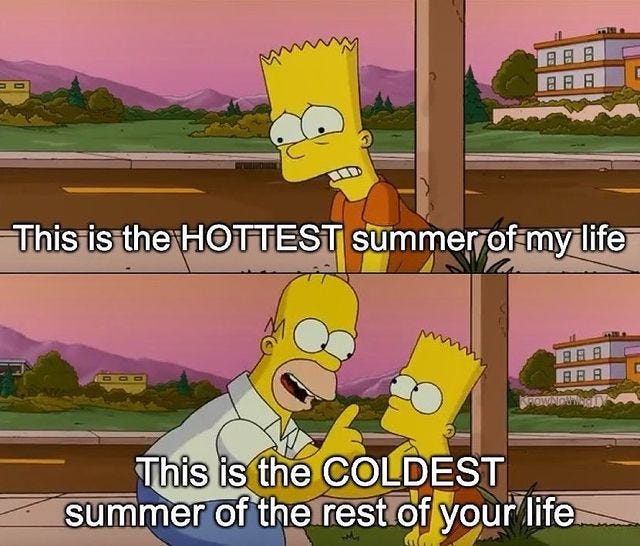My World's on Fire. How About Yours?
On getting older while the planet burns
It's a cool place and they say it gets colder
You're bundled up now, wait 'til you get older
But the meteor men beg to differ
Judging by the hole in the satellite picture
— Smash Mouth, “All Star”
The climatic danger that manmade carbon emissions pose for the planet has been settled science for my entire life. The United Nations Framework Convention on Climate Change was signed into agreement while I was in utero. The Kyoto Protocol was adopted when I was five. An Inconvenient Truth came out when I was 13. The only real debates I’ve been conscious of have been just how quickly and dramatically the effects of global warming would manifest — and the more-alarmist predictions have been right more often than not so far.
The impacts of climate change today are more pronounced than ever. Earlier this month the Earth set a new record for highest global temperature ever recorded. Then we broke that record the next day, and surpassed it again later that week. In one part of the planet, sea ice has receded to unprecedented lows; on the other side of the globe, ocean temperatures are reaching new highs. Here in the U.S., we’ve spent the summer dealing with both the direct consequences of global warming in the form of a lingering heatwave, and the indirect effects of climate change via the constant plumes of smoke from the worst Canadian wildfire season in history. Most distressing is that this is no mere fluke, or even a new equilibrium, but merely a step in an exacerbating trend. There’s a reason why insurance companies whose business is quantifying risk are no longer offering homeowner policies in Florida and California, and it’s not because they like limiting their customer bases.

The most alarming news of the week (as of this writing; at this rate, something worse could pop up by the time you read this) was a study predicting the collapse of the Atlantic Meridional Overturning Circulation by the end of the century, and possibly as soon as two years from now. I’m not a climatologist, but for most of my life I’ve been aware that the cessation of the Gulf Stream was a key component of the most-dire long-term scenarios if global warming worsened. That worst-case outcome now looks both more likely and closer to fruition, perhaps even within my lifetime.
Humanity’s plans to curtail carbon emissions and prevent these dire forecasts are … well, we’ll think of something, right? It’s become cliché to say we need to act now to avert catastrophe, but the fact is we have needed to act now for decades and have failed to do so. The longer we wait, the more dramatic the requisite countermeasures will be. The trend of non-binding pledges to reach net-zero emissions by some far-flung date, even if treated as sacrosanct and achieved with the help of some as-yet-invented scalable technological advances, still means the atmosphere accumulates carbon in the meantime. And there’s only so much curbing emissions will do to mitigate global warming then if the Gulf Stream has already stopped.
Well, the years start coming and they don't stop coming
Fed to the rules and I hit the ground running
As I write this essay, I am less than a fortnight away from my 31st birthday. Thirty-one appears to be an anticlimactic number. I see it as a subtle transition. At 30, you’re often lumped in with the young-adult cohort, depending on the specifics of the wording. A pedant could argue that I am currently still in the last year of my twenties; in under two weeks I’ll be genuinely into my thirties. I am approaching the age of being truly a generation ahead of even other adults.
Improving the world is often described in terms of older folks making life better for the next generations. Turning 31 feels like the turning point where you stop representing the future and start preparing to pass the baton to those still to come.
I picked a hell of a time for that.
The ice we skate is getting pretty thin
The water's getting warm so you might as well swim
Somewhere inside the matryoshka doll of sobering climate realities is the recognition that our collective fate is largely divorced from individual behaviors. Yes, being a good citizen in the modern age requires cognizance of your carbon footprint, and (not but) as in many areas of life, focusing on personal choices obscures the government’s responsibility to care for its people and the orders-of-magnitude-greater environmental impact of large corporations. The expendability of personal cars is directly related to the accessibility of public transportation; using paper straws feels silly while airlines intentionally fly empty planes around the world.
Not that those with the power to do more are acting with requisite urgency. Here in the U.S., a man who campaigned on Believing Science and represents the more-eco-friendly major party holds the Presidency. (Seriously fighting climate change will require international solutions, but given that we have the second-highest carbon emissions in the world and are stubbornly insistent about our hegemon status, it is in no small part a problem of American politics.) Yet Joe Biden’s response to this summer’s converging climate crises has been nothing of substance. The administration’s apparent disinterest in pushing for greater environmental protections in the wake of these events would be astounding if we weren’t accustomed to it. The decarbonization provisions in last year’s Inflation Reduction Act constituted significant progress, but it’s woefully insufficient if that represents the extent of federal climate legislation we will enact for the foreseeable future.
Even considering Congressional obstructionism and keeping in mind that a Republican White House would have even less interest in staving off global warming, Biden’s hands are not clean. He broke his campaign promise to end oil drilling on federal land. He was apparently surprised to learn that antagonistic posturing towards China would complicate bilateral climate action between the two highest-emitting countries. His botching of the debt-ceiling negotiations led to approving a new natural-gas pipeline and weakening energy-permit oversight, and his disinterest in Supreme Court reform means abiding the judicial-activist project to gut the EPA’s regulatory powers. In an ideal world, the 2024 Democratic primaries would feature a challenge from someone who gives a damn about climate action.
But let’s put all that aside and accept the party line that it will take a filibuster-proof Democratic Senate majority for the U.S. to take serious action and become a global leader on climate change. What is the plan to win 60 Senate seats? How long will that take? And what happens if the Gulf Stream collapses first?
We are not the metaphorical frogs in a pot, blithely unaware that the water is getting warmer. We are actively cranking up the power burner for ourselves and our tadpoles.
Somebody once asked “Could I spare some change for gas?
I need to get myself away from this place”
I said, "Yup, what a concept
I could use a little fuel myself
And we could all use a little change”
Doom and gloom are not praxis. I wish I had answers or original insights instead of just depressing observations. I want to believe the phrase “tipping point” can refer not just to ensuring forthcoming catastrophe but also to spurring the world to action. That a globe ablaze will finally serve as a warning flare. That maybe, just maybe, the willfully ignorant fossil-fuel executives and negligent politicians will realize that no amount of money or power can save them from a continent-wide plume of smoke; that a rising tide sinks all coastlines.
I’ve spent 30 years wondering how our forebears could be so irresponsible as to put us in this position — how cognitive dissonance could metastasize so thoroughly that people who claim to care about their children’s children could shrug their shoulders at an existential planetary threat. In a few days, I’m making what feels like the invisible transition from part of the future to a protector of it. My world’s on fire, but more importantly so is the next generation’s. If we don’t act fast, they won’t need somebody to tell them that this world is gonna roll them.




